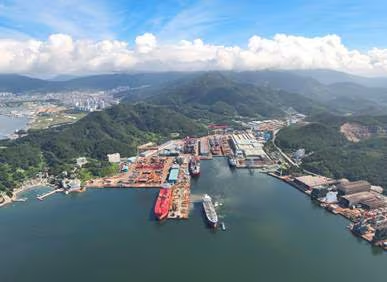According to ChosunBiz, the business news outlet of The Chosun Ilbo, the global new shipbuilding market is expected to shrink next year, putting South Korea’s mid-sized shipbuilders on the edge. Demand for ships has also fallen due to weak shipping conditions and the deferral of carbon emission regulations by the International Maritime Organization (IMO).

According to The Export-Import Bank of Korea’s Overseas Economic Research Institute on the 4th, global new ship orders next year are analyzed to be 35 million CGT (compensated gross tonnage), down 14.6% from this year’s estimate. This year’s order volume is expected to fall 45.9% from a year earlier, and next year it will decline further.
Domestic shipbuilders’ orders this year are estimated at about 9.5 million CGT, down 12.5% from a year earlier. Next year’s order outlook is about 9 million CGT. Last year, mid-sized shipbuilders booked 800,000 CGT, but this year and next year that is expected to fall to the 600,000 CGT range.
The industry believes the newbuild market has contracted due to factors such as deteriorating shipping conditions and the deferral of IMO regulations. There are also projections that the IMO rules could be postponed until the end of U.S. President Donald Trump’s term, as Trump is leading the opposition.
The KDCI, a bulk carrier freight index, reached 26,779 in 2023 but fell to 19,951 on the 30th of last month. The Shanghai Containerized Freight Index (SCFI), a container freight indicator, also climbed to 5,109 during COVID-19 but fell to 1,403 on the 24th of last month.
If newbuild orders decline, mid-sized shipbuilders are expected to be hit first. That is because large domestic shipbuilders have secured three years of work, while mid-sized shipbuilders have secured only about two years’ worth. In addition, mid-sized shipbuilders primarily build vessels not affected by the United States Trade Representative (USTR) restrictions on the entry of Chinese ships, making it difficult to expect benefits from U.S. regulations. The United States does not impose entry duties on Chinese ships for container vessels of 4,000 TEU or less and bulk carriers of 55,000 DWT or less.
An industry official said, “The shipbuilding industry generally needs to secure more than two years of work to operate stably,” adding, “Since domestic mid-sized shipbuilders have secured about two years of work, if orders decrease next year, management could become unstable.” The official also said, “Ships built by domestic mid-sized shipbuilders are competitively superior in quality compared with Chinese firms, so refund guarantees (RG) should be sufficiently issued to help them overcome the crisis.”


